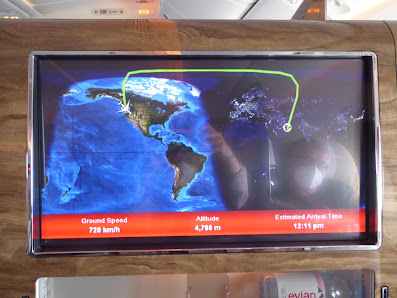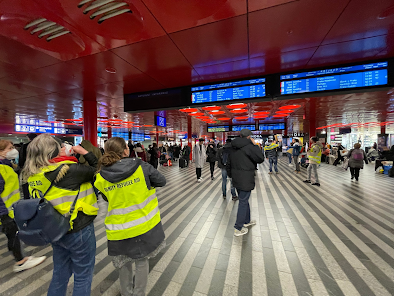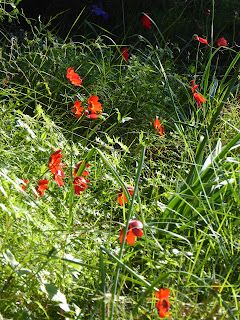'It isn't in our backyard, but it is certainly in the neighborhood,' wrote a fellow expat on Facebook of the invasion of Ukraine. He and his wife live in Prague, capitol of the Czech Republic. We used to live a few miles apart back in the Seattle suburbs.
 |
| Digital Art from Ukraine (details below) |
Another expat friend and former Kirkland resident, now living in Switzerland, observed that being where we all find ourselves now 'gives us a different perspective than when we were 'home' [in the States]'.
 |
| A different perspective of war from this side of the sea |
They both nailed it. We definitely have a different perspective than if we were all still some 8,000 miles away. Actually, it is amazing that we have so many expat friends from our old stomping ground on this side of the sea. Each of us willingly made the choice to leave all that we knew for the unknowns of a new country and culture. This week I think, "What a luxury, that word 'choice'?".
We chose to leave our homes, friends and family behind unlike those forced to flee Ukraine this week.
 |
| In Prague helping to meet basic needs |
Our friends in Prague are helping with the Ukraine refugee relocation effort there. Many are arriving with nothing more than a small bag of belongings.. The numbers are mind-boggling: 5,000 a day, some 30,000 arrivals in the last week. The volunteers are scrambling to find accommodations both for refugees and to provide basic necessities.
 |
| Volunteers await arriving refugees at the Prague train station |
The phrase, 'all the comforts of home', comes to mind as I look around our Greek Stone House on the Hill. We've brought so many items with us and have purchased the remainder of items necessary to make this house a home. Again, a luxury of choice unlike those who were so abruptly uprooted from their homes by the Russian invasion.
In Greece the numbers of arriving Ukrainians last week were just over 1,000. We know more are coming and efforts are underway to welcome and accommodate them. Throughout Europe authorities are racing to reduce red tape while volunteers meet, greet and try to ease these displaced persons into temporary housing.
 |
| Collection drive in Mani poster |
Fundraising and collection drives are underway - even in our sparsely-populated slice of rural Greece. Just this morning I noted a collection drive notice and collection bin at our local supermarket.
In The Neighborhood
 |
| Ukraine is to the northeast of Greece |
The direct line distance between Greece and Ukraine is 1,276 km, or 793 miles. However the real travel distance is just over 1,668 km or 1,036.7 miles. For those back in the States, it would be like living in Washington State and having a war break out in California.
 |
| Military ship off the coast of Ukraine 2014 |
Our media reports that Greek armed forces are on full alert. They also report a significant number of warships - both American and Russian fleets - are sailing a wider area of the Mediterranean.
With restrictions finally being eased by authorities for travelers to Greece, there had been a feeling of optimism about this year's tourism bringing the lagging sector out of the doldrums caused by the pandemic. However, Russian tourists account for a large number of visitors to Greece. Estimates were for 303,843 inbound seats from Russia to Greece in the next six months.
I am reading more and more comments on Facebook Travel pages from those in the U.S. who are again rethinking travel plans to anywhere in Europe while this conflict continues.
Tourism is going to be impacted.. . but to what degree remains to be seen.
Meanwhile life goes on as Normal
 |
| Serene sunsets at Costa Navarino this week |
However dire the headlines right now, I want to assure you that life is continuing quite normally around here.
The Scout and I just returned from a two night stay at the Costa Navarino luxury resort to the northwest of us and the place was full of golfers - European golfers, not just Greek locals. The first two flights of the season - both from Germany -- landed a week ago at the Kalamata Airport and we suspect a large number of our fellow guests had been on those flights.
 |
| Almond trees are in bloom |
Afraid we aren't real sympathetic to those in the States fretting about possible price increases at the pump as a result of the invasion. Here we are paying $8US a gallon in the city and closer to $9 a gallon here in the village. And that isn't because of the invasion - it is what we have been paying for some time. We are braced for increases.
 |
| Wildflowers are in bloom |
Our electric bills are so ridiculously high -- thanks to the European energy crisis, not the conflict - that we also brace ourselves for the shock of what we will find when opening the bill. In January we had a 600 euro bill, nearly $700US for a couple of months. (On that topic we are using the fireplace and oil furnace much more than our electric heat/AC units.)
 |
| Kalamata ready for visitors |
The villages and Kalamata are opening up for the season with all the fun and fanfare that comes with spring. Restaurants and tavernas closed for the winter are getting spruced up with new paint and new fixtures. We are heading into Lent here with Clean Monday celebrations after having celebrated Carnivale last week. Greek authorities are removing the 'mask-up' mandate when outside and they anticipate having - finally, after two years - 'normal' Easter celebrations.
And for those travelers coming this way, rejoice: the pesky Passenger Locator Form, is on its way out!
Yet, Lest We Forget
 |
Last year's ferry trip on the Mediterranean Sea
|
Yesterday the BBC, British Broadcasting Corporation, announced it has returned to old fashioned short-wave radios as a means of reaching Ukrainians who are cut off from normal sources of news. Four hours each day of news will be broadcast in English over short-wave frequencies that can be heard on cheap devices in Kyiv and parts of Russia. The announcement couldn't help but make one think of World War II and the role short-wave radio played then.
 |
| Victims skulls - memorial Chora Sfakia |
We live in an area of Greece that has known conflict and blood-shed brought on by attempts of outside forces to rule this area through the ages. The memories and horrors of invasions - from the time of the Venetians and the Ottomans to the Germans and Italians during World War II - remain vivid here. The significance of what is happening to Ukraine is sadly all too real for so many.
Before I close this week, I want to mention the artwork used in the blog opening is a digital piece created by a Ukrainian artist that was purchased by a friend from Etsy Shop. Purchases provide money to those in Ukraine and the art being digital is available immediately to the purchaser. The photos from Prague are from posts by Cheryl and Chip Kimball, our friends from Kirkland. Anyone wanting more information on their efforts there, please contact us and we will put you in touch.
Safe travels to you all and thanks for the time you spent with us this week. Our tales and travels will continue and hope to see you back here for the next installment~
Linking soon with:

















































